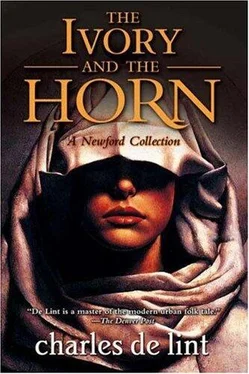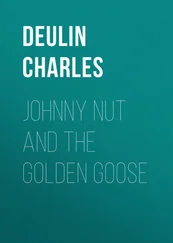But I'm getting off on a tangent. I started off meaning just to introduce myself, and here I am, giving you my life story. What I really wanted to tell you about was Mr. Truepenny.
The thing you have to understand is that I made him up. He was like one of those invisible childhood friends, except I deliberately created him.
We weren't exactly well-off when I was growing up. When my mother left us, I ended up being one of those latchkey kids. We didn't live in the best part of town; Upper Foxville is a rough part of the city and it could be a scary place for a little girl who loved art and books and got teased for that love by the other neighborhood kids, who couldn't even be bothered to learn how to read. When I got home from school, I went straight in and locked the door.
I'd get supper ready for my dad, but there were always a couple of hours to kill in between my arriving home and when he finished work— longer if he had to work late. We didn't have a TV, so I read a lot, but we couldn't afford to buy books. On Saturday mornings, we'd go to the library and I'd take out my limit— five books— which I'd finish by Tuesday, even if I tried to stretch them out.
To fill the rest of the time, I'd draw on shopping bags or the pads of paper that dad brought me home from work, but that never seemed to occupy enough hours. So one day I made up Mr. Truepenny.
I'd daydream about going to his shop. It was the most perfect place that I could imagine: all dark wood and leaded glass, thick carpets and club chairs with carved wooden-based reading lamps strategically placed throughout. The shelves were filled with leather-bound books and folios, and there was a small art gallery in the back.
The special thing about Mr. Truepenny's shop was that all of its contents existed only within its walls. Shakespeare's The Storm of Winter. The Chapman's Tale by Chaucer. The Blissful Stream by William Morris. Steinbeck's companion collection to The Long Valley, Salinas. North Country Stoic by Emily Brontë.
None of these books existed, of course, but being the dreamy sort of kid that I was, not only could I daydream of visiting Mr. Truepenny's shop, but I could actually read these unwritten stories. The gallery in the back of the shop was much the same. There hung works by the masters that saw the light of day only in my imagination. Van Goghs and Monets and da Vincis. Rossettis and Homers and Cézannes.
Mr. Truepenny himself was a wonderfully eccentric individual who never once chased me out for being unable to make a purchase. He had a Don Quixote air about him, a sense that he was forever tilting at windmills. He was tall and thin with a thatch of mouse-brown hair and round spectacles, a rumpled tweed suit and a huge briar pipe that he continually fussed with but never actually lit. He always greeted me with genuine affection and seemed disappointed when it was time for me to go.
My imagination was so vivid that my daydream visits to his shop were as real to me as when my dad took me to the library or to the Newford Gallery of Fine Art. But it didn't last. I grew up, went to Butler University on student loans and the money from far too many menial jobs—"got a life," as the old saying goes. I made friends, I was so busy, there was no time, no need to visit the shop anymore. Eventually I simply forgot all about it.
Until I met Janice Petrie.
Wendy and I were in the Market after a late night at her place the previous evening. I was on my way home, but we'd decided to shop for groceries together before I left. Trying to make up my mind between green beans and a head of broccoli, my gaze lifted above the vegetable stand and met that of a little girl standing nearby with her parents. Her eyes widened with recognition though I'd never seen her before.
"You're the woman!" she cried. "You're the woman who's evicting Mr. Truepenny. I think it s a horrible thing to do. You're a horrible woman!"
And then she started to cry. Her mother shushed her and apologized to me for the out burst before bustling the little girl away.
"What was all that about; Sophie?" Wendy asked me.
"I have no idea," I said.
But of course I did. I was just so astonished by the encounter that I didn't know what to say. I changed the subject and that was the end of it until I got home I dug out an old cardboard box from the back of my hall closet and rooted about in it until I came up with a folder of drawings I'd done when I still lived with my dad. Near the back I found the ones I was looking for.
They were studies of Mr. Truepenny and his amazing shop.
God, I thought, looking at these awkward drawings, pencil on brown grocery-bag paper, ballpoint on foolscap. The things we forget.
I took the drawings out onto my balcony and lay down on the old sofa I kept out there, studying them, one by one. There was Mr. Truepenny, writing something in his big leather-bound ledger. Here was another of him, holding his cat, Dodger, the two of them looking out the leaded glass windows of the shop. There was a view of the main aisle of the shop, leading down to the gallery, the perspective slightly askew, but not half bad considering I was no older when I did them than was the little girl in the Market today.
How could she have known? I found myself thinking. Mr. Truepenny and his shop were something I'd made up. I couldn't remember ever telling anyone else about them— not even Jilly. And what did she mean about my evicting him from the shop?
I could think of no rational response. After a while, I just set the drawings aside and tried to forget about it. Exhaustion from the late night before soon had me nodding off, and I fell asleep only to find myself, not in my boyfriend's faerie dream world, but on the streets of Mabon, the made-up city in which I'd put Mr. Truepenny's Book Emporium and Gallery.
***
I'm half a block from the shop. The area's changed. The once-neat cobblestones are thick with grime. Refuse lies everywhere. Most of the storefronts are boarded up, their walls festooned with graffiti. When I reach Mr. Truepenny's shop, I see a sign in the window that reads, CLOSING SOON DUE TO LEASE EXPIRATION.
Half-dreading what I'll find, I open the door and hear the familiar little bell tinkle as I step inside. The shop's dusty and dim, and much smaller than I remember it. The shelves are almost bare. The door leading to the gallery is shut and has a CLOSED sign tacked onto it.
"Ah, Miss Etoile. It's been so very long."
I turn to find Mr. Truepenny at his usual station behind the front counter. He's smaller than I remember as well, and looks a little shabby now. Hair thinning, tweed suit threadbare and more shapeless than ever.
"What... what's happened to the shop?" I ask.
I've forgotten that I'm asleep on the sofa out on my balcony. All I know is this awful feeling I have inside as I look at what's become of my old childhood haunt.
"Well, times change," he says. "The world moves on."
"This— is this my doing?"
His eyebrows rise quizzically.
"I met this little girl and she said I was evicting you."
"I don't blame you," Mr. Truepenny says, and I can see in his sad eyes that it's true. "You've no more need for me or my wares, so it's only fair that you let us fade."
"But you... that is... well, you're not real."
I feel weird saying this, because while I remember now that I'm dreaming, this place is like one of my faerie dreams that feel as real as the waking world.
"That's not strictly true," he tells me. "You did conceive of the city and this shop, but we were drawn to fit the blueprint of your plan from... elsewhere."
"What elsewhere?"
He frowns, brow furrowing as he thinks.
"I'm not really sure myself," he tells me.
Читать дальше












